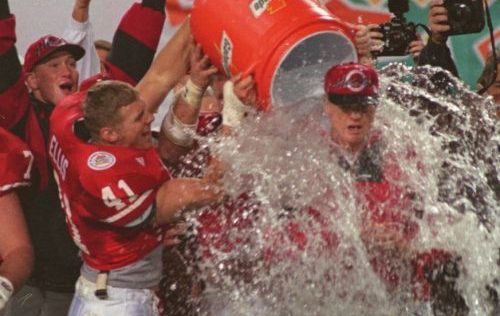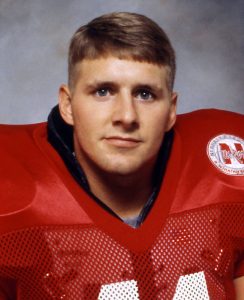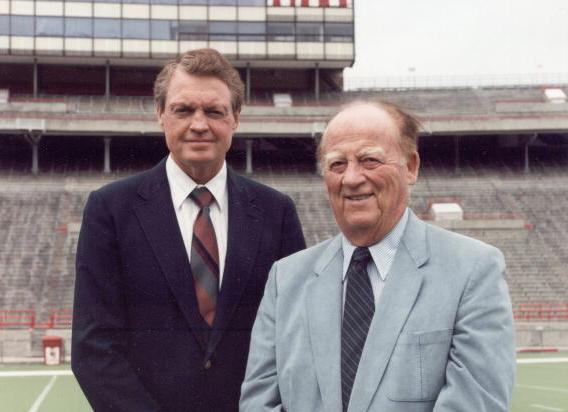Anatomy of an Era: Phil Ellis, Part 1

Excerpted from Chapter 62, No Place Like Nebraska: Anatomy of an Era, Vol. 2 by Paul Koch
One winter his cattle had perished in a blizzard. The next summer one of his plow horses broke its leg in a prairie-dog hole and had to be shot. Another summer he lost his hogs from cholera, and a valuable stallion died from a rattlesnake bite. Time and again his crops had failed. He had lost two children, boys, that came between Lou and Emil, and there had been the cost of sickness and death. Now, when he had at last struggled out of debt, he was going to die himself. He was only forty-six, and had, of course, counted upon more time.
-Willa Cather, O Pioneers!, Courtesy of the Willa Cather Trust
The story never goes exactly as we would dream it. But therein lies the drama, the struggle that- when we finally emerge from its duration?- we find ourselves better people for the experience. Any struggle or great endeavor needs its fair share of leaders, and Phil Ellis is one who readily comes to mind when I think of the ’94 and ’95 teams, the latter of which he was a senior co-captain.
Owning his fair share of struggles as a freshman scout teamer going against one of the greatest to ever play the game, in the end he, too, became a better man for it. Like a linebacker shooting the gap and plugging the hole, one of Grand Island’s finest gets down quickly to brass tacks in this exchange. Let’s hear what Phil has to offer…
Notable quote #1:
“The Lawrence Phillips deal kind of brought us together, too, as a team in ’95, and that was trying for everybody and the spotlight was on us. We just kind of looked after each other and it was an ‘us against the world’-mentality a little bit for a while there. Everyone wanted to see us lose and not succeed. And that was fun, because it seemed whoever we plugged in there, it went well.”
Phil Ellis
Scholarship recruit, Linebacker, Grand Island, NE
Where are they now? Grand Island, NE, Sales
Question: Hey Phil, thanks for making time to talk about what it took to achieve that level of excellence at Nebraska while you were there, specifically the process and the mindset of that buildup to your junior and senior years.
Phil Ellis: I guess for me it was more the losing in ’93 more than anything. (laughs) That game that we lost? We had the 1:16 on the scoreboard that whole next summer.
Q: That stands out to you as a turning point?
PE: Yeah, I think it was. We had a goal and we all came back together as such a team. I don’t know if we were racially split as a team. (In ’93 we had that Leslie Dennis/Lance Lundberg incident, which was kind of a black-and-white deal.) For us linebackers it wasn’t -we weren’t really in on that- but it happened during bowl week preparations. And you could say we were a divided team. I could guess that would be for any team, but for me? Us gelling together? We had one goal in mind and it didn’t matter if you were black, white or yellow, starter or non-starter, you just had to get out there and do it.

And then you had Brook and Tommie and that was a gelling point, and Matt Turman, too. There were a lot of things, but I guess initially: losing in ’93 the way we lost, where we might have thought we won the game. I always tell people, “If we would have won in ’93 I’m not sure if we would have won the other two.”
Q: It’s funny you say that, Phil. I’m sure you get asked about that, but I’ve always wondered if that loss, in retrospect, was the best thing that could have happened for you guys…
PE: Yeah. It was bad for them, those seniors, but it was good for the program and good for us. It kind of gave us confidence, too, that we could play with them. You know, we’d been to so many damn Orange Bowls -which was four in a row for me- and we just got beat down every time by a better Florida-based team. So it gave us confidence, for one, that we could play with them and we should have won. And I guess, two, I guess just the way we lost it and how they protected Charlie Ward. (laughs) But anyway, we had to sacrifice that year, and I try to tell those ’93 guys that when I see them, that it made us better in the long run. And I hope they understand that.
Q: So you went to Grand Island Senior High and you live there today, right? Was ’91 your first year at Nebraska?
PE: Yes, it was 1991.
Q: Did you redshirt your freshman year?
PE: I did.
Q: What do you recall from your first day on campus?
PE: My first day I saw Christian Peter, who came in at 6’3” 320 lbs, just all Jersey accent. I was like, ‘What position do you play?’ He was like, “D-Tackle.” I was thinking, ‘Oh, good. I’m on defense, too.’ (laughs) Christian was just huge, and I was like, ‘What am I doing here?’
I do recall we played the 5-2 defense back then, and I always went against Will Shields. I knew Will was good, you know, and was trying my hardest all day long in practice -busting my ass and running as hard as I can- and Will would be laughing and blocking me, no problem. It was easy for him, going, “No problem. This guy is easy.” I guess it made me better as a player, because I would try to do well on the scout team.
Q: What was the mindset of a scout-teamer? Was it to elevate yourself? Was it to elevate the team’s starters to become better? Or was it to try to dominate them, embarrass them and elevate yourself in the process?
PE: No, I’d never try to embarrass someone. A fullback would give me a wink, a head nod, letting me know they were going to come hit me in the mouth… and I’d make them look good. (laughs) I understood my role. And I’d try to get over there and make a play, and then Will would come over and take me out. The point was, I always thought Will was good, but when Will won the Outland Trophy I was like, ‘Oh, okay. I was going against the best!’ It made it all worth my time, I guess.
Q: Kind of elevated yourself in your own mind?
PE: Yeah, here I thought I was doing bad, going, ‘What am I doing wrong?’, and all of a sudden I’m like, ‘Oh, now I get it. He’s just good!’ (laughs) Here he ends up being like a thirteen-year All-Pro. I’d always get my ass kicked by that guy. That’s what I tell people, which is kind of funny.
Q: With Will playing at such a high level in the NFL for so long, you’re probably one of the only men who can realistically say that, “The older I get the better I was.”
PE: Oh yeah. I was an all-star. (laughs)
Q: So who were your first friends?
PE: Oh, (Aaron) Graham and Brook (Berringer), we were all pretty close. I was Brook’s roommate after my freshman year, that summer going into my sophomore year. That was fun.

Available on Amazon.com
Funny story about Aaron Graham: it was him and me and Brook and (Mark) Gilman, and we were all sitting there and didn’t know Aaron from nobody, you know? And Aaron goes, “Here, let me show you this tape.” So he pops in a tape of his high school all-star game and starts going off about how good he was and was pretty big on himself. And he looks at Gilman and he’s like, “What did you play in high school?” And Gilman was, “Quarterback.” He looks at Brook and says, “What did you play? Quarterback, too?” Brook says, “Yeah.” And Aaron goes, “Dude, you’d be like third string in Texas.” (laughs) Then he looks at me and goes, “You look like a punter.” We’ve laughed about that for years.
Q: So Graham was very confident of himself from the start, huh?
PE: Oh, yeah. He was not short on confidence.
Q: Do you think that benefited or hindered him?
PE: Oh, you have to be confident in your ability. And then later he was, “Now that I’ve seen you guys play, you guys are awesome.” (laughs) He kind of backtracked a little bit, but it was funny. You had to be there. We just walked out of the room and were, “Who the hell does that guy think he is?” (laughs) Me and Graham and Brook were roommates for four years in college, so it worked out all right.
Q: It seemed I would see you and Brook over at the Devaney Sports Center a lot. Were you guys dating some gals on another sports team?
PE: Oh, Brook was always dating somebody. (laughs) It wasn’t me.
Q: So Coach Steele was already in place as your position coach, right?
PE: Yeah, and we learned a lot more. That’s when we were going through the transition from the 5-2 to the 4-3. We had Ed Stewart and the 4-3 was more of a nickel package, and in ’93 it became our full-time defense. It was the new deal that Steele implemented.
Q: Oh really?
PE: Well, he says he did. Who knows. (laughs)
Q: Was it a big thing making the switch to the 4-3? How did you see that, growing up as a kid and watching the Husker games and being used to the 5-2?
PE: I didn’t care. I was the strongside linebacker anyway, and switched to the MIKE and was still calling the plays. I was still ‘the guy,’ so to speak. You’d be doing what you’d always do, just in the middle. Actually your responsibility was a little bit less and you had tackle to tackle and that’s about it.
Q: So take me from your first day as a freshman to your last game. What changes in the program, what metamorphoses took place?
PE: Oh, I guess we were cruising along in ’91, ’92, ’93. We’d win the Big 8 each year and just go down to Florida. And I’d play special teams and wasn’t in a starting role or anything.
But in ’94, of course, we worked a lot harder. All summer long we kind of came together. And we implemented the Unity Council, coming in. The Lawrence Phillips deal kind of brought us together, too, as a team in ’95, and that was trying for everybody and the spotlight was on us. We just kind of looked after each other and it was an ‘us against the world’ mentality a little bit for a while there. Everyone wanted to see us lose and not succeed. And that was fun, because it seemed whoever we plugged in there, it went well.
Q: It seems to me, Phil, in the years building up to ’94 it was all about earning respect, about finally reaching the top. And then in ’95, do you think it was the “us against the world” thing that made all the difference?
PE: Well, it wasn’t on purpose. It was just that we were cruising along and winning by large margins. I just looked at the side of the ring and it was 64 to 21 versus Oklahoma State, 50 to 10 Michigan State, scores like that. It was almost too easy, like you were playing with your kids or something. (laughs) Then the Lawrence deal happened.
And I was team captain and on the Unity Council -and Osborne loved all of us so much, he was getting literally 2 hours of sleep a night, and was literally thinking about quitting that year. And you don’t want to be the team that had Coach Osborne quit- so we implemented “no bars, no drinking, you get caught with alcohol you get kicked off the team.” Pretty strict rules, you know, for college kids, for ourselves, you know? ..It was kind of like, “All right guys, this is getting real out of control, so let’s bring ’em in and take care of business and just do it.” So we implemented some pretty drastic steps and I remember it didn’t go over too well, but we got it done and just had to do what we had to do.
Q: And your being a captain and on the Unity Council, you probably caught a few guys not living up to those standards, no?
PE: Oh, there were a couple younger guys, but most of the guys who were starting or played a playing role, they knew what they had to do. And I’m not bashing the other teams later on like ’99 or ’98 (I’d hear stories about those guys getting drunk on Thursday nights), and I can honestly say that no one on that ’95 team would ever seriously think of doing that, going out to the bars or nothing. It was, “Hey, if you get caught at the bar, caught with DUI or anything, you were off the team.” Even if you were a captain, starter, non-starter, whatever, you were done.
Q: Zero tolerance, huh?
PE: Zero tolerance. It was unprecedented and you didn’t want to do it, but you had to do it. Those guys, the younger guys, we’d built something up so nicely for them and they took advantage of it a bit; it was kind of like a slap in the head.
Q: Sure, you and your class had made all these sacrifices and had been through the wringer, and you felt they may not have appreciated those actions as much as they perhaps should have?
PE: Yeah, and you couldn’t really go back and say, “Hey, I’m Phil Ellis and this is the way you do it.’ You know?
Q: (laughs) Although you probably wanted to?
PE: Yeah, (laughs) but the good thing about it was Matt Vrzal, who owned all those bars downtown for a while. He knew all this stuff so he kind of played big brother to them and he’d go to them and say, “Hey, why don’t you guys go home.” And they told him what they thought. (laughs)
Q: And you know what, I think that family atmosphere is always what made Nebraska ‘Nebraska’ at that time. In talking with you guys after all these years, most everyone has a pleasant demeanor, is easy to laugh, they value their bonds of friendship.
PE: I keep telling people it’s the best-kept secret in America.
Q: And you being a Nebraska boy, what was your mindset when you first came on? Did you just want to contribute and make the team? Did you want to win a national championship? Did you have your eyes set on the pros?
PE: Oh no, All I wanted to do was play for Nebraska. They offered me a scholarship before my senior year. I didn’t take any recruiting trips and just accepted a scholarship right away. I had USC and Kansas State and others wanting me to play for them. I had ’em all looking at me, a big target on my back. But this was ‘Nebraska.’
Q: Why would it have been just Nebraska? Was it because you were a fan, because of Coach Osborne? What was the linchpin?
PE: It was Osborne, it was the history, it was growing up in Nebraska. Nowadays it’s “What are you gonna do for me? How are you gonna get me to the next level?” Back in the ’90’s I was talking to Aaron Graham and he asked me, “Why did you come to Nebraska?” and I said, “Well, it wasn’t that Nebraska was any better than Texas or Texas A&M. But Nebraska is good. It’s great, the tradition and all.”
 Hall of Fame coaches Nebr. Sports Info)
Hall of Fame coaches Nebr. Sports Info)
Q: Why do you think Aaron asked that question?
PE: I don’t know. Heck, he spent his summer here before his freshman year in college. He’d always liked Nebraska. You’ll have to talk to him for a better answer. It was an honor, I guess, for me to be asked to play for Nebraska. Talking to the walk-ons? It’s the same type of feeling, being asked to walk on. It was an honor to be given a scholarship, because to this day it just amazes me.
But yeah, I was a starting middle linebacker what was that, 14 years ago? And people still remember me. It’s like, “Hey Phil, how are you doing?” And I’m like, ‘Seriously?! People still remember me?’ Heck, I can barely remember half of my teammates’ names. (laughs)
Q: But strangers remember you, huh?
PE: Yeah, that’s unbelievable. The fans of Nebraska, they just know. It’s amazing. They’re nuts. There’s a million of ’em, too. (laughs)
To be continued….
Copyright @ 2013 Thermopylae Press. All Rights Reserved.
Photo Credits : Unknown Original Sources/Updates Welcomed